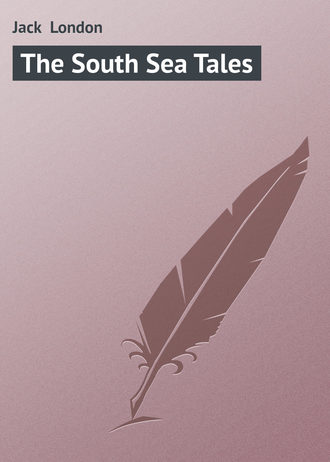
Джек Лондон
The South Sea Tales
His lips were a contused, shapeless mass, and his mouth was full of blood and broken teeth.
"That'll teach you that back talk don't go with me," the trader shouted, purple with rage, peering down at him over the broken railing.
Mauki had never met a white man like this, and he resolved to walk small and never offend. He saw the boat boys knocked about, and one of them put in irons for three days with nothing to eat for the crime of breaking a rowlock while pulling. Then, too, he heard the gossip of the village and learned why Bunster had taken a third wife—by force, as was well known. The first and second wives lay in the graveyard, under the white coral sand, with slabs of coral rock at head and feet. They had died, it was said, from beatings he had given them. The third wife was certainly ill-used, as Mauki could see for himself.
But there was no way by which to avoid offending the white man who seemed offended with life. When Mauki kept silent, he was struck and called a sullen brute. When he spoke, he was struck for giving back talk. When he was grave, Bunster accused him of plotting and gave him a thrashing in advance; and when he strove to be cheerful and to smile, he was charged with sneering at his lord and master and given a taste of stick. Bunster was a devil.
The village would have done for him, had it not remembered the lesson of the three schooners. It might have done for him anyway, if there had been a bush to which to flee. As it was, the murder of the white men, of any white man, would bring a man-of-war that would kill the offenders and chop down the precious cocoanut trees. Then there were the boat boys, with minds fully made up to drown him by accident at the first opportunity to capsize the cutter. Only Bunster saw to it that the boat did not capsize.
Mauki was of a different breed, and escape being impossible while Bunster lived, he was resolved to get the white man. The trouble was that he could never find a chance. Bunster was always on guard. Day and night his revolvers were ready to hand. He permitted nobody to pass behind his back, as Mauki learned after having been knocked down several times. Bunster knew that he had more to fear from the good-natured, even sweet-faced, Malaita boy than from the entire population of Lord Howe; and it gave added zest to the programme of torment he was carrying out. And Mauki walked small, accepted his punishments, and waited.
All other white men had respected his tambos, but not so Bunster.
Mauki's weekly allowance of tobacco was two sticks. Bunster passed them to his woman and ordered Mauki to receive them from her hand. But this could not be, and Mauki went without his tobacco. In the same way he was made to miss many a meal, and to go hungry many a day. He was ordered to make chowder out of the big clams that grew in the lagoon. This he could not do, for clams were tambo. Six times in succession he refused to touch the clams, and six times he was knocked senseless. Bunster knew that the boy would die first, but called his refusal mutiny, and would have killed him had there been another cook to take his place.
One of the trader's favorite tricks was to catch Mauki's kinky locks and bat his head against the wall. Another trick was to catch Mauki unawares and thrust the live end of a cigar against his flesh. This Bunster called vaccination, and Mauki was vaccinated a number of times a week. Once, in a rage, Bunster ripped the cup handle from Mauki's nose, tearing the hole clear out of the cartilage.
"Oh, what a mug!" was his comment, when he surveyed the damage he had wrought.
The skin of a shark is like sandpaper, but the skin of a ray fish is like a rasp. In the South Seas the natives use it as a wood file in smoothing down canoes and paddles. Bunster had a mitten made of ray fish skin. The first time he tried it on Mauki, with one sweep of the hand it fetched the skin off his back from neck to armpit. Bunster was delighted. He gave his wife a taste of the mitten, and tried it out thoroughly on the boat boys. The prime ministers came in for a stroke each, and they had to grin and take it for a joke.
"Laugh, damn you, laugh!" was the cue he gave.
Mauki came in for the largest share of the mitten. Never a day passed without a caress from it. There were times when the loss of so much cuticle kept him awake at night, and often the half-healed surface was raked raw afresh by the facetious Mr. Bunster. Mauki continued his patient wait, secure in the knowledge that sooner or later his time would come. And he knew just what he was going to do, down to the smallest detail, when the time did come.
One morning Bunster got up in a mood for knocking seven bells out of the universe. He began on Mauki, and wound up on Mauki, in the interval knocking down his wife and hammering all the boat boys. At breakfast he called the coffee slops and threw the scalding contents of the cup into Mauki's face. By ten o'clock Bunster was shivering with ague, and half an hour later he was burning with fever. It was no ordinary attack. It quickly became pernicious, and developed into black-water fever. The days passed, and he grew weaker and weaker, never leaving his bed. Mauki waited and watched, the while his skin grew intact once more. He ordered the boys to beach the cutter, scrub her bottom, and give her a general overhauling. They thought the order emanated from Bunster, and they obeyed. But Bunster at the time was lying unconscious and giving no orders. This was Mauki's chance, but still he waited.
When the worst was past, and Bunster lay convalescent and conscious, but weak as a baby, Mauki packed his few trinkets, including the china cup handle, into his trade box. Then he went over to the village and interviewed the king and his two prime ministers.
"This fella Bunster, him good fella you like too much?" he asked.
They explained in one voice that they liked the trader not at all. The ministers poured forth a recital of all the indignities and wrongs that had been heaped upon them. The king broke down and wept. Mauki interrupted rudely.
"You savve me—me big fella marster my country. You no like m this fella white marster. Me no like m. Plenty good you put hundred cocoanut, two hundred cocoanut, three hundred cocoanut along cutter. Him finish, you go sleep m good fella. Altogether kanaka sleep m good fella. Bime by big fella noise along house, you no savve hear m that fella noise. You altogether sleep strong fella too much."
In like manner Mauki interviewed the boat boys. Then he ordered Bunster's wife to return to her family house. Had she refused, he would have been in a quandary, for his tambo would not have permitted him to lay hands on her.
The house deserted, he entered the sleeping room, where the trader lay in a doze. Mauki first removed the revolvers, then placed the ray fish mitten on his hand. Bunster's first warning was a stroke of the mitten that removed the skin the full length of his nose.
"Good fella, eh?" Mauki grinned, between two strokes, one of which swept the forehead bare and the other of which cleaned off one side of his face. "Laugh, damn you, laugh."
Mauki did his work throughly, and the kanakas, hiding in their houses, heard the "big fella noise" that Bunster made and continued to make for an hour or more.
When Mauki was done, he carried the boat compass and all the rifles and ammunition down to the cutter, which he proceeded to ballast with cases of tobacco. It was while engaged in this that a hideous, skinless thing came out of the house and ran screaming down the beach till it fell in the sand and mowed and gibbered under the scorching sun. Mauki looked toward it and hesitated. Then he went over and removed the head, which he wrapped in a mat and stowed in the stern locker of the cutter.
So soundly did the kanakas sleep through that long hot day that they did not see the cutter run out through the passage and head south, close-hauled on the southeast trade. Nor was the cutter ever sighted on that long tack to the shores of Ysabel, and during the tedious head-beat from there to Malaita. He landed at Port Adams with a wealth of rifles and tobacco such as no one man had ever possessed before. But he did not stop there. He had taken a white man's head, and only the bush could shelter him. So back he went to the bush villages, where he shot old Fanfoa and half a dozen of the chief men, and made himself the chief over all the villages. When his father died, Mauki's brother ruled in Port Adams, and joined together, salt-water men and bushmen, the resulting combination was the strongest of the ten score fighting tribes of Malaita.
More than his fear of the British government was Mauki's fear of the all-powerful Moongleam Soap Company; and one day a message came up to him in the bush, reminding him that he owed the Company eight and one-half years of labor. He sent back a favorable answer, and then appeared the inevitable white man, the captain of the schooner, the only white man during Mauki's reign, who ventured the bush and came out alive. This man not only came out, but he brought with him seven hundred and fifty dollars in gold sovereigns—the money price of eight years and a half of labor plus the cost price of certain rifles and cases of tobacco.
Mauki no longer weighs one hundred and ten pounds. His stomach is three times its former girth, and he has four wives. He has many other things—rifles and revolvers, the handle of a china cup, and an excellent collection of bushmen's heads. But more precious than the entire collection is another head, perfectly dried and cured, with sandy hair and a yellowish beard, which is kept wrapped in the finest of fibre lava-lavas. When Mauki goes to war with villages beyond his realm, he invariably gets out this head, and alone in his grass palace, contemplates it long and solemnly. At such times the hush of death falls on the village, and not even a pickaninny dares make a noise. The head is esteemed the most powerful devil-devil on Malaita, and to the possession of it is ascribed all of Mauki's greatness.
"Yah! Yah! Yah!"
He was a whiskey-guzzling Scotchman, and he downed his whiskey neat, beginning with his first tot punctually at six in the morning, and thereafter repeating it at regular intervals throughout the day till bedtime, which was usually midnight. He slept but five hours out of the twenty-four, and for the remaining nineteen hours he was quietly and decently drunk. During the eight weeks I spent with him on Oolong Atoll, I never saw him draw a sober breath. In fact, his sleep was so short that he never had time to sober up. It was the most beautiful and orderly perennial drunk I have ever observed.
McAllister was his name. He was an old man, and very shaky on his pins. His hand trembled as with a palsy, especially noticeable when he poured his whiskey, though I never knew him to spill a drop. He had been twenty-eight years in Melanesia, ranging from German New Guinea to the German Solomons, and so thoroughly had he become identified with that portion of the world, that he habitually spoke in that bastard lingo called "bech-de-mer." Thus, in conversation with me, SUN HE COME UP meant sunrise; KAI-KAI HE STOP meant that dinner was served; and BELLY BELONG ME WALK ABOUT meant that he was sick at his stomach. He was a small man, and a withered one, burned inside and outside by ardent spirits and ardent sun. He was a cinder, a bit of a clinker of a man, a little animated clinker, not yet quite cold, that moved stiffly and by starts and jerks like an automaton. A gust of wind would have blown him away. He weighed ninety pounds.
But the immense thing about him was the power with which he ruled. Oolong Atoll was one hundred and forty miles in circumference. One steered by compass course in its lagoon. It was populated by five thousand Polynesians, all strapping men and women, many of them standing six feet in height and weighing a couple of hundred pounds. Oolong was two hundred and fifty miles from the nearest land. Twice a year a little schooner called to collect copra. The one white man on Oolong was McAllister, petty trader and unintermittent guzzler; and he ruled Oolong and its six thousand savages with an iron hand. He said come, and they came, go, and they went. They never questioned his will nor judgment. He was cantankerous as only an aged Scotchman can be, and interfered continually in their personal affairs. When Nugu, the king's daughter, wanted to marry Haunau from the other end of the atoll, her father said yes; but McAllister said no, and the marriage never came off. When the king wanted to buy a certain islet in the lagoon from the chief priest, McAllister said no. The king was in debt to the Company to the tune of 180,000 cocoanuts, and until that was paid he was not to spend a single cocoanut on anything else.
And yet the king and his people did not love McAllister. In truth, they hated him horribly, and, to my knowledge, the whole population, with the priests at the head, tried vainly for three months to pray him to death. The devil-devils they sent after him were awe-inspiring, but since McAllister did not believe in devil-devils, they were without power over him. With drunken Scotchmen all signs fail. They gathered up scraps of food which had touched his lips, an empty whiskey bottle, a cocoanut from which he had drunk, and even his spittle, and performed all kinds of deviltries over them. But McAllister lived on. His health was superb. He never caught fever; nor coughs nor colds; dysentery passed him by; and the malignant ulcers and vile skin diseases that attack blacks and whites alike in that climate never fastened upon him. He must have been so saturated with alcohol as to defy the lodgment of germs. I used to imagine them falling to the ground in showers of microscopic cinders as fast as they entered his whiskey-sodden aura. No one loved him, not even germs, while he loved only whiskey, and still he lived.
I was puzzled. I could not understand six thousand natives putting up with that withered shrimp of a tyrant. It was a miracle that he had not died suddenly long since. Unlike the cowardly Melanesians, the people were high-stomached and warlike. In the big graveyard, at head and feet of the graves, were relics of past sanguinary history—blubber-spades, rusty old bayonets and cutlasses, copper bolts, rudder-irons, harpoons, bomb guns, bricks that could have come from nowhere but a whaler's trying-out furnace, and old brass pieces of the sixteenth century that verified the traditions of the early Spanish navigators. Ship after ship had come to grief on Oolong. Not thirty years before, the whaler BLENNERDALE, running into the lagoon for repair, had been cut off with all hands. In similar fashion had the crew of the GASKET, a sandalwood trader, perished. There was a big French bark, the TOULON, becalmed off the atoll, which the islanders boarded after a sharp tussle and wrecked in the Lipau Passage, the captain and a handful of sailors escaping in the longboat. Then there were the Spanish pieces, which told of the loss of one of the early explorers. All this, of the vessels named, is a matter of history, and is to be found in the SOUTH PACIFIC SAILING DIRECTORY. But that there was other history, unwritten, I was yet to learn. In the meantime I puzzled why six thousand primitive savages let one degenerate Scotch despot live.
One hot afternoon McAllister and I sat on the veranda looking out over the lagoon, with all its wonder of jeweled colors. At our backs, across the hundred yards of palm-studded sand, the outer surf roared on the reef. It was dreadfully warm. We were in four degree south latitude and the sun was directly overhead, having crossed the Line a few days before on its journey south. There was no wind—not even a catspaw. The season of the southeast trade was drawing to an early close, and the northwest monsoon had not yet begun to blow.
"They can't dance worth a damn," said McAllister.
I had happened to mention that the Polynesian dances were superior to the Papuan, and this McAllister had denied, for no other reason than his cantankerousness. But it was too not to argue, and I said nothing. Besides, I had never seen the Oolong people dance.
"I'll prove it to you," he announced, beckoning to the black New Hanover boy, a labor recruit, who served as cook and general house servant. "Hey, you, boy, you tell 'm one fella king come along me."
The boy departed, and back came the prime minister, perturbed, ill at ease, and garrulous with apologetic explanation. In short, the king slept, and was not to be disturbed.
"King he plenty strong fella sleep," was his final sentence.
McAllister was in such a rage that the prime minister incontinently fled, to return with the king himself. They were a magnificent pair, the king especially, who must have been all of six feet three inches in height. His features had the eagle-like quality that is so frequently found in those of the North American Indian. He had been molded and born to rule. His eyes flashed as he listened, but right meekly he obeyed McAllister's command to fetch a couple of hundred of the best dancers, male and female, in the village. And dance they did, for two mortal hours, under that broiling sun. They did not love him for it, and little he cared, in the end dismissing them with abuse and sneers.
The abject servility of those magnificent savages was terrifying. How could it be? What was the secret of his rule? More and more I puzzled as the days went by, and though I observed perpetual examples of his undisputed sovereignty, never a clew was there as to how it was.
One day I happened to speak of my disappointment in failing to trade for a beautiful pair of orange cowries. The pair was worth five pounds in Sydney if it was worth a cent. I had offered two hundred sticks of tobacco to the owner, who had held out for three hundred. When I casually mentioned the situation, McAllister immediately sent for the man, took the shells from him, and turned them over to me. Fifty sticks were all he permitted me to pay for them. The man accepted the tobacco and seemed overjoyed at getting off so easily. As for me, I resolved to keep a bridle on my tongue in the future. And still I mulled over the secret of McAllister's power. I even went to the extent of asking him directly, but all he did was to cock one eye, look wise, and take another drink.
One night I was out fishing in the lagoon with Oti, the man who had been mulcted of the cowries. Privily, I had made up to him an additional hundred and fifty sticks, and he had come to regard me with a respect that was almost veneration, which was curious, seeing that he was an old man, twice my age at least.
"What name you fella kanaka all the same pickaninny?" I began on him. "This fella trader he one fella. You fella kanaka plenty fella too much. You fella kanaka just like 'm dog—plenty fright along that fella trader. He no eat you, fella. He no get 'm teeth along him. What name you too much fright?"
"S'pose plenty fella kanaka kill m?" he asked.
"He die," I retorted. "You fella kanaka kill 'm plenty fella white man long time before. What name you fright this fella white man?"
"Yes, we kill 'm plenty," was his answer. "My word! Any amount! Long time before. One time, me young fella too much, one big fella ship he stop outside. Wind he no blow. Plenty fella kanaka we get 'm canoe, plenty fella canoe, we go catch 'm that fella ship. My word—we catch 'm big fella fight. Two, three white men shoot like hell. We no fright. We come alongside, we go up side, plenty fella, maybe I think fifty-ten (five hundred). One fella white Mary (woman) belong that fella ship. Never before I see 'm white Mary. Bime by plenty white man finish. One fella skipper he no die. Five fella, six fella white man no die. Skipper he sing out. Some fella white man he fight. Some fella white man he lower away boat. After that, all together over the side they go. Skipper he sling white Mary down. After that they washee (row) strong fella plenty too much. Father belong me, that time he strong fella. He throw 'm one fella spear. That fella spear he go in one side that white Mary. He no stop. My word, he go out other side that fella Mary. She finish. Me no fright. Plenty kanaka too much no fright."
Old Oti's pride had been touched, for he suddenly stripped down his lava-lava and showed me the unmistakable scar of a bullet. Before I could speak, his line ran out suddenly. He checked it and attempted to haul in, but found that the fish had run around a coral branch. Casting a look of reproach at me for having beguiled him from his watchfulness, he went over the side, feet first, turning over after he got under and following his line down to bottom. The water was ten fathoms. I leaned over and watched the play of his feet, growing dim and dimmer, as they stirred the wan phosphorescence into ghostly fires. Ten fathoms—sixty feet—it was nothing to him, an old man, compared with the value of a hook and line. After what seemed five minutes, though it could not have been more than a minute, I saw him flaming whitely upward. He broke surface and dropped a ten pound rock cod into the canoe, the line and hook intact, the latter still fast in the fish's mouth.
"It may be," I said remorselessly. "You no fright long ago. You plenty fright now along that fella trader."
"Yes, plenty fright," he confessed, with an air of dismissing the subject. For half an hour we pulled up our lines and flung them out in silence. Then small fish-sharks began to bite, and after losing a hook apiece, we hauled in and waited for the sharks to go their way.
"I speak you true," Oti broke into speech, "then you savve we fright now."
I lighted up my pipe and waited, and the story that Oti told me in atrocious bech-de-mer I here turn into proper English. Otherwise, in spirit and order of narrative, the tale is as it fell from Oti's lips.
"It was after that that we were very proud. We had fought many times with the strange white men who live upon the sea, and always we had beaten them. A few of us were killed, but what was that compared with the stores of wealth of a thousand thousand kinds that we found on the ships? And then one day, maybe twenty years ago, or twenty-five, there came a schooner right through the passage and into the lagoon. It was a large schooner with three masts. She had five white men and maybe forty boat's crew, black fellows from New Guinea and New Britain; and she had come to fish beche-de-mer. She lay at anchor across the lagoon from here, at Pauloo, and her boats scattered out everywhere, making camps on the beaches where they cured the beche-de-mer. This made them weak by dividing them, for those who fished here and those on the schooner at Pauloo were fifty miles apart, and there were others farther away still.
"Our king and headmen held council, and I was one in the canoe that paddled all afternoon and all night across the lagoon, bringing word to the people of Pauloo that in the morning we would attack the fishing camps at the one time and that it was for them to take the schooner. We who brought the word were tired with the paddling, but we took part in the attack. On the schooner were two white men, the skipper and the second mate, with half a dozen black boys. The skipper with three boys we caught on shore and killed, but first eight of us the skipper killed with his two revolvers. We fought close together, you see, at hand grapples.
"The noise of our fighting told the mate what was happening, and he put food and water and a sail in the small dingy, which was so small that it was no more than twelve feet long. We came down upon the schooner, a thousand men, covering the lagoon with our canoes. Also, we were blowing conch shells, singing war songs, and striking the sides of the canoes with our paddles. What chance had one white man and three black boys against us? No chance at all, and the mate knew it.
"White men are hell. I have watched them much, and I am an old man now, and I understand at last why the white men have taken to themselves all the islands in the sea. It is because they are hell. Here are you in the canoe with me. You are hardly more than a boy. You are not wise, for each day I tell you many things you do not know. When I was a little pickaninny, I knew more about fish and the ways of fish than you know now. I am an old man, but I swim down to the bottom of the lagoon, and you cannot follow me. What are you good for, anyway? I do not know, except to fight. I have never seen you fight, yet I know that you are like your brothers and that you will fight like hell. Also, you are a fool, like your brothers. You do not know when you are beaten. You will fight until you die, and then it will be too late to know that you are beaten.
"Now behold what this mate did. As we came down upon him, covering the sea and blowing our conches, he put off from the schooner in the small boat, along with the three black boys, and rowed for the passage. There again he was a fool, for no wise man would put out to sea in so small a boat. The sides of it were not four inches above the water. Twenty canoes went after him, filled with two hundred young men. We paddled five fathoms while his black boys were rowing one fathom. He had no chance, but he was a fool. He stood up in the boat with a rifle, and he shot many times. He was not a good shot, but as we drew close many of us were wounded and killed. But still he had no chance.
"I remember that all the time he was smoking a cigar. When we were forty feet away and coming fast, he dropped the rifle, lighted a stick of dynamite with the cigar, and threw it at us. He lighted another and another, and threw them at us very rapidly, many of them. I know now that he must have split the ends of the fuses and stuck in match heads, because they lighted so quickly. Also, the fuses were very short. Sometimes the dynamite sticks went off in the air, but most of them went off in the canoes. And each time they went off in a canoe, that canoe was finished. Of the twenty canoes, the half were smashed to pieces. The canoe I was in was so smashed, and likewise the two men who sat next to me. The dynamite fell between them. The other canoes turned and ran away. Then that mate yelled, Yah! Yah! Yah!' at us. Also he went at us again with his rifle, so that many were killed through the back as they fled away. And all the time the black boys in the boat went on rowing. You see, I told you true, that mate was hell.
"Nor was that all. Before he left the schooner, he set her on fire, and fixed up all the powder and dynamite so that it would go off at one time. There were hundreds of us on board, trying to put out the fire, heaving up water from overside, when the schooner blew up. So that all we had fought for was lost to us, besides many more of us being killed. Sometimes, even now, in my old age, I have bad dreams in which I hear that mate yell, Yah! Yah! Yah!' In a voice of thunder he yells, Yah! Yah! Yah!' But all those in the fishing camps were killed.
"The mate went out of the passage in his little boat, and that was the end of him we made sure, for how could so small a boat, with four men in it, live on the ocean? A month went by, and then, one morning, between two rain squalls, a schooner sailed in through our passage and dropped anchor before the village. The king and the headmen made big talk, and it was agreed that we would take the schooner in two or three days. In the meantime, as it was our custom always to appear friendly, we went off to her in canoes, bringing strings of cocoanuts, fowls, and pigs, to trade. But when we were alongside, many canoes of us, the men on board began to shoot us with rifles, and as we paddled away I saw the mate who had gone to sea in the little boat spring upon the rail and dance and yell, Yah! Yah! Yah!'
"That afternoon they landed from the schooner in three small boats filled with white men. They went right through the village, shooting every man they saw. Also they shot the fowls and pigs. We who were not killed got away in canoes and paddled out into the lagoon. Looking back, we could see all the houses on fire. Late in the afternoon we saw many canoes coming from Nihi, which is the village near the Nihi Passage in the northeast. They were all that were left, and like us their village had been burned by a second schooner that had come through Nihi Passage.
"We stood on in the darkness to the westward for Pauloo, but in the middle of the night we heard women wailing and then we ran into a big fleet of canoes. They were all that were left of Pauloo, which likewise was in ashes, for a third schooner had come in through the Pauloo Passage. You see, that mate, with his black boys, had not been drowned. He had made the Solomon Islands, and there told his brothers of what we had done in Oolong. And all his brothers had said they would come and punish us, and there they were in the three schooners, and our three villages were wiped out.
"And what was there for us to do? In the morning the two schooners from windward sailed down upon us in the middle of the lagoon. The trade wind was blowing fresh, and by scores of canoes they ran us down. And the rifles never ceased talking. We scattered like flying fish before the bonita, and there were so many of us that we escaped by thousands, this way and that, to the islands on the rim of the atoll.
"And thereafter the schooners hunted us up and down the lagoon. In the nighttime we slipped past them. But the next day, or in two days or three days, the schooners would be coming back, hunting us toward the other end of the lagoon. And so it went. We no longer counted nor remembered our dead. True, we were many and they were few. But what could we do? I was in one of the twenty canoes filled with men who were not afraid to die. We attacked the smallest schooner. They shot us down in heaps. They threw dynamite into the canoes, and when the dynamite gave out, they threw hot water down upon us. And the rifles never ceased talking. And those whose canoes were smashed were shot as they swam away. And the mate danced up and down upon the cabin top and yelled, "Yah! Yah! Yah!'







